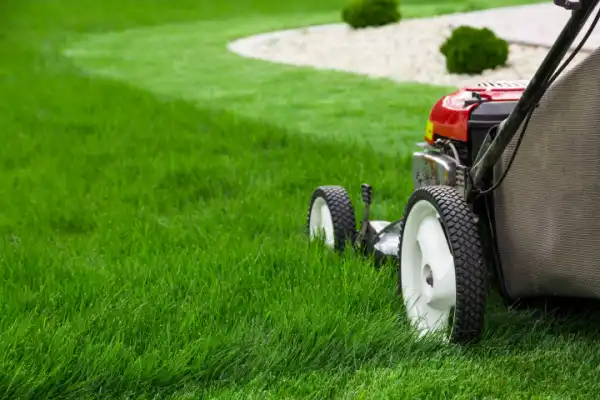Whether your property boasts a modest suburban yard or sprawls across a vast rural expanse, the importance of proper lawn care cannot be overstated for your Myrtle Beach, SC, residence. It serves to elevate your home's aesthetics, creating well-maintained surroundings that enhance both curb appeal and property values. Maintaining your lawn and landscape demands comprehensive expertise, spanning plant care, lawn mowing, irrigation, pruning, trimming, weeding, sprinkler systems, tree trimming, and fertilization. While enlisting the services of a professional landscaping company can yield outstanding results, you may still have questions about lawn care. Even with expert assistance, having a fundamental understanding of lawn care principles can be beneficial. Read this FAQ page about lawn care and landscaping services provided by The Grounds Guys of Myrtle Beach, and reach out if you have additional questions.

How Often Should I Mow My Lawn?
To maintain a year-round lush and attractive lawn, it's advisable to mow weekly. Allowing longer intervals between mowings can lead to excessive growth and increased weed presence, particularly during the faster-growing seasons of spring and summer. When mowing, ensure that your mower blades remain sharp and clean to prevent damage to the grass. Regular, consistent mowing encourages thicker grass growth and minimizes weed proliferation. It also eliminates brown or damaged grass tips, stimulating new, healthy growth. Here are some valuable tips for addressing lawn care questions related to mowing:
- Vary the direction of your mowing with each session to prevent soil compaction and ensure upright grass growth.
- If your lawn has become overgrown, avoid attempting to trim it all at once, as this can stress the grass and lead to potential damage. Instead, mow one-third of the grass height, allow the grass to recover for three or four days, and then mow again.
- Never mow wet grass, as it results in an uneven cut and a messy appearance. Wet grass clippings can also clog your mower and necessitate more frequent maintenance.
What Should Be the Ideal Height of My Grass?
Mowing exerts stress on grass blades and roots, necessitating time for grass to recover after each mowing session. While the ideal mowing height may vary slightly with the seasons, a fundamental rule applies avoid removing more than one-third of the grass blade height in a single mowing. Cutting the grass too short exposes the lawn's canopy to excessive sunlight and heat, fostering weed growth, particularly in warm months when weeds thrive on light. Taller grass possesses more plant tissue, retaining additional moisture, producing more chlorophyll, and shading the ground from direct sunlight. During warm weather, maintain slightly longer grass, and shorten it a bit during cooler seasons. For specific lawn care questions concerning proper mowing heights, consult with your Bergen County lawn care professional.
How Frequently Should I Water My Lawn?
Your lawn requires approximately one inch of water each week, which can be supplied by your sprinkler system or natural rainfall. This one-inch weekly irrigation is vital for nurturing fertile soil and robust grass roots. While water is essential for all lawns, excessive or insufficient watering can lead to lawn issues. Frequent, shallow watering encourages shallow grass roots while overwatering creates an ideal environment for harmful insects and lawn diseases. Opt for deep, infrequent watering, saturating the soil to a depth of around six inches two or three times a week instead of daily watering. In hot weather, regular, deep watering becomes especially critical to prevent soil and grass roots from drying out. For answers to your lawn care questions regarding overwatering or underwatering, consult your Bergen County lawn care professional.
What Is the Best Time to Water My Lawn?
The time of day when you water your lawn can significantly impact grass growth, weed proliferation, and lawn diseases. To achieve optimal lawn care results, remember these essential watering guidelines:
- Avoid watering during the hottest part of the day, typically between 11 a.m. and 3 p.m.
- Opt for morning watering between 6 a.m. and 10 a.m. when there is less direct sunlight, heat, and wind.
- If morning watering is not possible, consider late afternoon watering between 4 p.m. and 7 p.m.
- Avoid nighttime watering, as it can invite mildew, fungal diseases, and outdoor pests.
What Type of Grass Do I Have?
In the Myrtle Beach, SC region, most lawns consist of warm-season grasses that thrive in warmer climates. Warm-season grasses are typically found in the western or southern parts of the country, characterized by mild, consistent year-round temperatures. South Carolina grasses may include Bermuda, zoysia, centipede, and carpet grass. If you are uncertain about the type of grass in your lawn, your lawn care professional can address such lawn care questions. Grasses are generally categorized into two main types: cool-season grasses and warm-season grasses.
Cool-Season Grasses
These encompass fine and tall fescue, perennial ryegrass, bluegrass, and wheatgrass. They prefer mild, wet winters and are also well-suited to colder climates with snow and ice. Cool-season grasses thrive in areas with at least 30 inches or more of annual rainfall.
Warm-Season Grasses
This category includes Bermuda grass, buffalo grass, St. Augustine grass, and zoysia. Warm-season grasses thrive in hot, humid, and dry winters and summers, flourishing in regions with 20 inches or less of annual rainfall.
When Should I Plant New Grass?
Early fall is the optimal time for planting a new lawn. During this season, Myrtle Beach, SC, temperatures start to cool down, making it crucial to seed or so before the onset of cold weather. Overseeding, which involves planting grass seed directly into existing turf, can rejuvenate older lawns that appear thin and worn. When executed correctly, over-seeding addresses bare spots enhances turf density, introduces improved grass varieties, and enhances lawn color. Sod, on the other hand, offers the convenience of instant lawn installation but comes at a higher cost than grass seed. Typically, grass seed costs around $20 per 1,000 square feet of lawn surface, whereas sod may average approximately 35 cents per square foot. For best results, seed, or sod cool-season grasses when temperatures remain below 70 degrees. To explore lawn care questions related to lawn renovations, consult with The Grounds Guys of Myrtle Beach. Contact us today to request a job estimate.
 Click to call
Click to call

 Click to call
Click to call







